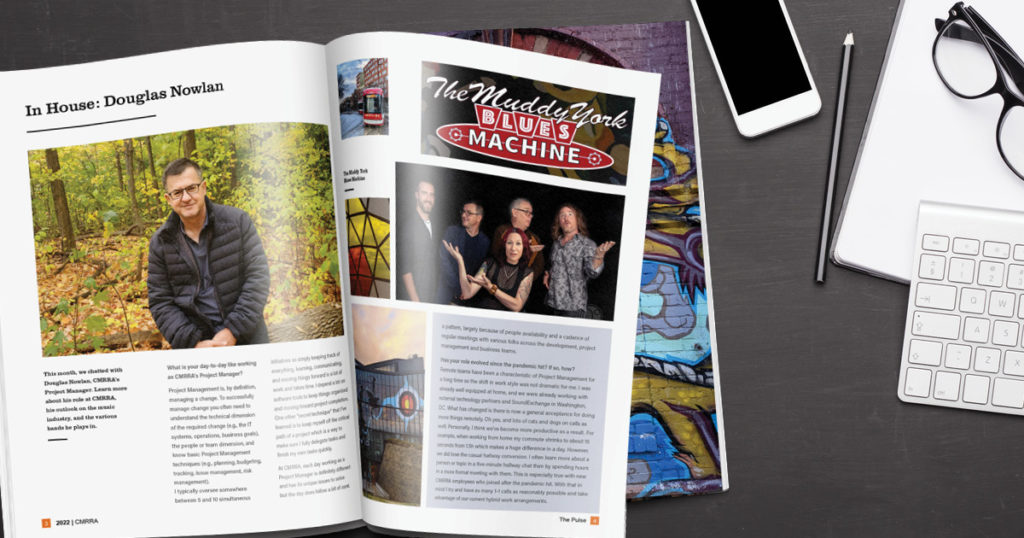This month, we chatted with Douglas Nowlan, CMRRA’s Project Manager. Learn more about his role at CMRRA, his outlook on the music industry, and the various bands he plays in.

What is your day-to-day like working as CMRRA’s Project Manager?
Project Management is, by definition, managing a change. To successfully manage change you often need to understand the technical dimension of the required change (e.g., the IT systems, operations, business goals), the people or team dimension, and know basic Project Management techniques (e.g., planning, budgeting, tracking, issue management, risk management).
I typically oversee somewhere between 5 and 10 simultaneous initiatives so simply keeping track of everything, learning, communicating, and moving things forward is a lot of work and takes time. I depend a lot on software tools to keep things organized and moving toward project completion. One other “secret technique” that I’ve learned is to keep myself off the critical path of a project which is a way to make sure I fully delegate tasks and finish my own tasks quickly.
At CMRRA, each day working as a Project Manager is definitely different and has its unique issues to solve but the day does follow a bit of a pattern, largely because of people availability and a cadence of regular meetings with various folks across the development, project management and business teams.
Has your role evolved since the pandemic hit? If so, how?
Remote teams have been a characteristic of Project Management for a long time so the shift in work style was not dramatic for me. I was already well equipped at home, and we were already working with external technology partners and SoundExchange in Washington, DC. What has changed is there is now a general acceptance for doing more things remotely. Oh yes, and lots of cats and dogs on calls as well. Personally, I think we’ve become more productive as a result. For example, when working from home my commute shrinks to about 15 seconds from 1.5h which makes a huge difference in a day. However, we did lose the casual hallway conversion. I often learn more about a person or topic in a five-minute hallway chat than by spending hours in a more formal meeting with them. This is especially true with new CMRRA employees who joined after the pandemic hit. With that in mind I try and have as many 1-1 calls as reasonably possible and take advantage of our current hybrid work arrangements.
What adjustments can you predict seeing over the next year or two as circumstances continue to change in the music industry?
Firstly, as a part-time musician I’m very concerned about deteriorating financial stability for musicians and songwriters. It’s always been difficult, but I think the irony of today is that music consumption is growing, new revenue streams are appearing, but songwriters and creators are still struggling to both acquire and maintain their share of the revenue flow derived from their work or are simply unable to make a career from music. To facilitate royalty flow between users of music and rights holders there needs to be common data exchange mechanisms, accurate music meta-data, accurate usage information and accurate ownership information. Achieving this is a complex industry wide issue but it all starts with artists registering their works and recordings. CMRRA, SoundExchange and now SX Works do their part to efficiently and effectively flow royalties back to rights holders but we are only a few slices of the total potential royalties derived from a musical work or recording.
Advances in AI technology, cloud storage and big data have given the industry the technical tools to accurately acquire, store and process repertoire and royalty data at increasingly lower costs. Meta-data standards have existed for a while but are now starting to be taken much more seriously given greater automation and data volumes. Overall, I think there is a huge opportunity for consolidation of musical work information which then can be offered as a service to both organizations and songwriters. For me this means more and more projects that work toward this goal, and I believe that CMRRA and SX are well positioned to take advantage of this need.
Have you been working on any other music projects outside of work? If so, what have you been up to?
Yes, absolutely! It’s what keeps me sane. I’m a keyboard player for 3 bands; Big Night Out (cover band), Muddy York Blues Machine (Alternative Blues), and Gone Fission (Fusion). I also jam often at a music club [The Jam Club] where I’m a member. My bands were relatively inactive through the pandemic but are now picking up again as the bars and clubs re-open and live music returns. With the alternative blues band, I just finished recording my parts for a new EP that will be coming out in the summer. I think we’ve set a record for longest duration to record 5 songs. Recording started in November 2019, just before the pandemic hit. Overall, I’m really, really looking forward to getting out there and playing again!
Editorial Note: Interested in learning more about Muddy York Blues Machine? Click here for more information.
Thinking about becoming a client of CMRRA? Already a client but you have questions? Email us at [email protected] and we’ll get you the answers you need.


